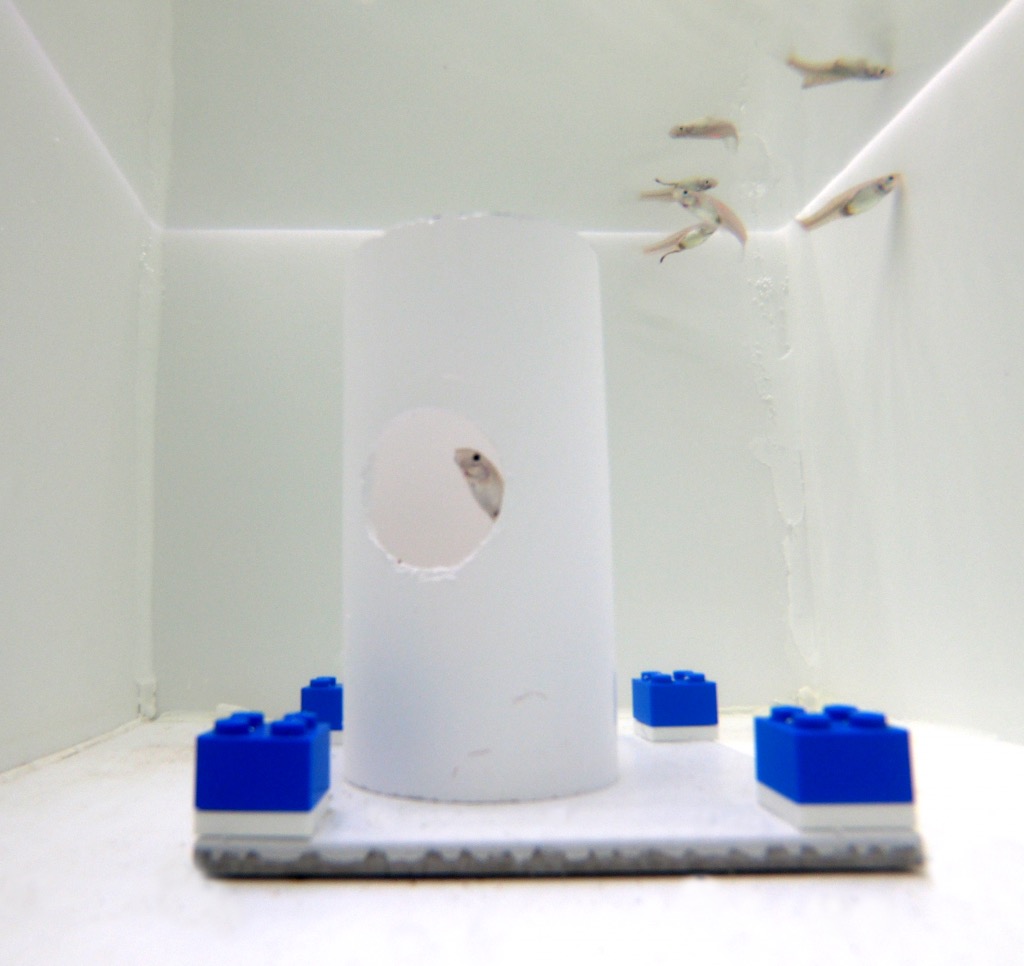A research project on how biological and artificial collectives learn and adapt to find collective solutions to complex problems

©SCIoI
The general objective of this project is to study dynamical adaptation and learning of biological and artificial collectives and how this contributes to collective solutions of complex problems outperforming individuals. We will study mechanisms of how individual agents within the collective acquire and share knowledge.
In particular, we will explore the role of partial, potentially conflicting or even erroneous, prior knowledge. The general scenario is a group of agents exploring a complex environment containing an a priori unknown number of targets (“food”). The targets themselves are not trivially accessible but are a) distributed in a complex environment, and b) need to be handled in a particular way to be successfully exploited. We are particularly interested in how collectives composed of individuals with partial prior knowledge (e.g. trained on different aspects of the foraging problem) combine their knowledge, and what the role of naive individuals without prior knowledge is.
On the analytical side, the main objective is to understand the benefits of grouping in terms of collective cognition. In particular, we want to explore two broad scenarios: 1) Situations where non-overlapping, partial knowledge of different individuals enhances collective performance, versus 2) cases where it impairs collective problem solving either because some prior knowledge is misleading or different priors leads to a stalemate (e.g. trained on different cues). Finally, we want to explore how partial knowledge (priors) interacts with possible persistent (fixed) heterogeneity within the collective (animal personalities) [BierbachNC].
On the synthetic side, methods from distributed and learning control theory will be extended and used to investigate the dynamics of collective learning. In particular, we will study (i) the interplay between prior knowledge, individual learning and knowledge transfer between agents, (ii) the relevance of the communication topology, and (iii) the effect of agent heterogeneity with respect to prior knowledge and learning strategies, dynamics and distortion of shared knowledge.
Formal methods developed on the synthetic side will be validated respectively improved using observations from two experimental testbeds – a biological one and a robotic one. Vice versa, methodological results will lead to a deeper understanding and to improved hypotheses on the analytical side.
Related Publications +
2756394
proj011
1
apa
50
creator
desc
year
20169
https://www.scienceofintelligence.de/wp-content/plugins/zotpress/
%7B%22status%22%3A%22success%22%2C%22updateneeded%22%3Afalse%2C%22instance%22%3Afalse%2C%22meta%22%3A%7B%22request_last%22%3A0%2C%22request_next%22%3A0%2C%22used_cache%22%3Atrue%7D%2C%22data%22%3A%5B%7B%22key%22%3A%22QZBEXFS5%22%2C%22library%22%3A%7B%22id%22%3A2756394%7D%2C%22meta%22%3A%7B%22creatorSummary%22%3A%22Sosna%20et%20al.%22%2C%22parsedDate%22%3A%222019%22%2C%22numChildren%22%3A1%7D%2C%22bib%22%3A%22%3Cdiv%20class%3D%5C%22csl-bib-body%5C%22%20style%3D%5C%22line-height%3A%202%3B%20padding-left%3A%201em%3B%20text-indent%3A-1em%3B%5C%22%3E%5Cn%20%20%3Cdiv%20class%3D%5C%22csl-entry%5C%22%3ESosna%2C%20M.%20M.%20G.%2C%20Twomey%2C%20C.%20R.%2C%20Bak-Coleman%2C%20J.%2C%20Poel%2C%20W.%2C%20Daniels%2C%20B.%20C.%2C%20Romanczuk%2C%20P.%2C%20%26amp%3B%20Couzin%2C%20I.%20D.%20%282019%29.%20Individual%20and%20collective%20encoding%20of%20risk%20in%20animal%20groups.%20%3Ci%3EProceedings%20of%20the%20National%20Academy%20of%20Sciences%3C%5C%2Fi%3E%2C%20%3Ci%3E116%3C%5C%2Fi%3E%2841%29%2C%2020556%26%23x2013%3B20561.%20%3Ca%20class%3D%27zp-DOIURL%27%20href%3D%27https%3A%5C%2F%5C%2Fdoi.org%5C%2F10.1073%5C%2Fpnas.1905585116%27%3Ehttps%3A%5C%2F%5C%2Fdoi.org%5C%2F10.1073%5C%2Fpnas.1905585116%3C%5C%2Fa%3E%3C%5C%2Fdiv%3E%5Cn%3C%5C%2Fdiv%3E%22%2C%22data%22%3A%7B%22itemType%22%3A%22journalArticle%22%2C%22title%22%3A%22Individual%20and%20collective%20encoding%20of%20risk%20in%20animal%20groups%22%2C%22creators%22%3A%5B%7B%22creatorType%22%3A%22author%22%2C%22firstName%22%3A%22Matthew%20M.%20G.%22%2C%22lastName%22%3A%22Sosna%22%7D%2C%7B%22creatorType%22%3A%22author%22%2C%22firstName%22%3A%22Colin%20R.%22%2C%22lastName%22%3A%22Twomey%22%7D%2C%7B%22creatorType%22%3A%22author%22%2C%22firstName%22%3A%22Joseph%22%2C%22lastName%22%3A%22Bak-Coleman%22%7D%2C%7B%22creatorType%22%3A%22author%22%2C%22firstName%22%3A%22Winnie%22%2C%22lastName%22%3A%22Poel%22%7D%2C%7B%22creatorType%22%3A%22author%22%2C%22firstName%22%3A%22Bryan%20C.%22%2C%22lastName%22%3A%22Daniels%22%7D%2C%7B%22creatorType%22%3A%22author%22%2C%22firstName%22%3A%22Pawel%22%2C%22lastName%22%3A%22Romanczuk%22%7D%2C%7B%22creatorType%22%3A%22author%22%2C%22firstName%22%3A%22Iain%20D.%22%2C%22lastName%22%3A%22Couzin%22%7D%5D%2C%22abstractNote%22%3A%22%22%2C%22date%22%3A%222019%22%2C%22language%22%3A%22%22%2C%22DOI%22%3A%2210.1073%5C%2Fpnas.1905585116%22%2C%22ISSN%22%3A%22%22%2C%22url%22%3A%22https%3A%5C%2F%5C%2Fwww.pnas.org%5C%2Fcontent%5C%2F116%5C%2F41%5C%2F20556%22%2C%22collections%22%3A%5B%5D%2C%22dateModified%22%3A%222025-05-30T15%3A00%3A36Z%22%7D%7D%2C%7B%22key%22%3A%22UH8JK7WP%22%2C%22library%22%3A%7B%22id%22%3A2756394%7D%2C%22meta%22%3A%7B%22creatorSummary%22%3A%22Raoufi%20et%20al.%22%2C%22parsedDate%22%3A%222021%22%2C%22numChildren%22%3A1%7D%2C%22bib%22%3A%22%3Cdiv%20class%3D%5C%22csl-bib-body%5C%22%20style%3D%5C%22line-height%3A%202%3B%20padding-left%3A%201em%3B%20text-indent%3A-1em%3B%5C%22%3E%5Cn%20%20%3Cdiv%20class%3D%5C%22csl-entry%5C%22%3ERaoufi%2C%20M.%2C%20Hamann%2C%20H.%2C%20%26amp%3B%20Romanczuk%2C%20P.%20%282021%29.%20Speed-vs-Accuracy%20Tradeoff%20in%20Collective%20Estimation%3A%20An%20Adaptive%20Exploration-Exploitation%20Case.%20%3Ci%3EIEEE%202021%20International%20Symposium%20on%20Multi-Robot%20and%20Multi-Agent%20Systems%20%28MRS%29%3C%5C%2Fi%3E.%20%3Ca%20class%3D%27zp-ItemURL%27%20href%3D%27https%3A%5C%2F%5C%2Fdoi.org%5C%2F10.1109%5C%2FMRS50823.2021.9620695%27%3Ehttps%3A%5C%2F%5C%2Fdoi.org%5C%2F10.1109%5C%2FMRS50823.2021.9620695%3C%5C%2Fa%3E%3C%5C%2Fdiv%3E%5Cn%3C%5C%2Fdiv%3E%22%2C%22data%22%3A%7B%22itemType%22%3A%22conferencePaper%22%2C%22title%22%3A%22Speed-vs-Accuracy%20Tradeoff%20in%20Collective%20Estimation%3A%20An%20Adaptive%20Exploration-Exploitation%20Case%22%2C%22creators%22%3A%5B%7B%22creatorType%22%3A%22author%22%2C%22firstName%22%3A%22Mohsen%22%2C%22lastName%22%3A%22Raoufi%22%7D%2C%7B%22creatorType%22%3A%22author%22%2C%22firstName%22%3A%22Heiko%22%2C%22lastName%22%3A%22Hamann%22%7D%2C%7B%22creatorType%22%3A%22author%22%2C%22firstName%22%3A%22Pawel%22%2C%22lastName%22%3A%22Romanczuk%22%7D%5D%2C%22abstractNote%22%3A%22%22%2C%22date%22%3A%222021%22%2C%22proceedingsTitle%22%3A%22IEEE%202021%20International%20Symposium%20on%20Multi-Robot%20and%20Multi-Agent%20Systems%20%28MRS%29%22%2C%22conferenceName%22%3A%22%22%2C%22language%22%3A%22%22%2C%22DOI%22%3A%2210.1109%5C%2FMRS50823.2021.9620695%22%2C%22ISBN%22%3A%22%22%2C%22url%22%3A%22https%3A%5C%2F%5C%2Fdoi.org%5C%2F10.1109%5C%2FMRS50823.2021.9620695%22%2C%22collections%22%3A%5B%5D%2C%22dateModified%22%3A%222025-05-30T15%3A00%3A34Z%22%7D%7D%2C%7B%22key%22%3A%22WL2NMC4T%22%2C%22library%22%3A%7B%22id%22%3A2756394%7D%2C%22meta%22%3A%7B%22creatorSummary%22%3A%22Molinari%20et%20al.%22%2C%22parsedDate%22%3A%222022%22%2C%22numChildren%22%3A0%7D%2C%22bib%22%3A%22%3Cdiv%20class%3D%5C%22csl-bib-body%5C%22%20style%3D%5C%22line-height%3A%202%3B%20padding-left%3A%201em%3B%20text-indent%3A-1em%3B%5C%22%3E%5Cn%20%20%3Cdiv%20class%3D%5C%22csl-entry%5C%22%3EMolinari%2C%20F.%2C%20Agrawal%2C%20N.%2C%20Sta%26%23x144%3Bczak%2C%20S.%2C%20%26amp%3B%20Raisch%2C%20J.%20%282022%29.%20Over-The-Air%20Max-Consensus%20in%20Clustered%20Networks%20Adopting%20Half-Duplex%20Communication%20Technology.%20%3Ci%3EIEEE%20Transactions%20on%20Control%20of%20Network%20Systems%3C%5C%2Fi%3E%2C%20%3Ci%3EEarly%20access%3C%5C%2Fi%3E.%20%3Ca%20class%3D%27zp-DOIURL%27%20href%3D%27https%3A%5C%2F%5C%2Fdoi.org%5C%2F10.1109%5C%2FTCNS.2022.3212870%27%3Ehttps%3A%5C%2F%5C%2Fdoi.org%5C%2F10.1109%5C%2FTCNS.2022.3212870%3C%5C%2Fa%3E%3C%5C%2Fdiv%3E%5Cn%3C%5C%2Fdiv%3E%22%2C%22data%22%3A%7B%22itemType%22%3A%22journalArticle%22%2C%22title%22%3A%22Over-The-Air%20Max-Consensus%20in%20Clustered%20Networks%20Adopting%20Half-Duplex%20Communication%20Technology%22%2C%22creators%22%3A%5B%7B%22creatorType%22%3A%22author%22%2C%22firstName%22%3A%22Fabio%22%2C%22lastName%22%3A%22Molinari%22%7D%2C%7B%22creatorType%22%3A%22author%22%2C%22firstName%22%3A%22Navneet%22%2C%22lastName%22%3A%22Agrawal%22%7D%2C%7B%22creatorType%22%3A%22author%22%2C%22firstName%22%3A%22S%5Cu0142awomir%22%2C%22lastName%22%3A%22Sta%5Cu0144czak%22%7D%2C%7B%22creatorType%22%3A%22author%22%2C%22firstName%22%3A%22J%5Cu00f6rg%22%2C%22lastName%22%3A%22Raisch%22%7D%5D%2C%22abstractNote%22%3A%22%22%2C%22date%22%3A%222022%22%2C%22language%22%3A%22%22%2C%22DOI%22%3A%2210.1109%5C%2FTCNS.2022.3212870%22%2C%22ISSN%22%3A%22%22%2C%22url%22%3A%22%22%2C%22collections%22%3A%5B%5D%2C%22dateModified%22%3A%222025-05-30T15%3A00%3A34Z%22%7D%7D%2C%7B%22key%22%3A%222XTYAFU3%22%2C%22library%22%3A%7B%22id%22%3A2756394%7D%2C%22meta%22%3A%7B%22creatorSummary%22%3A%22Meindl%20et%20al.%22%2C%22parsedDate%22%3A%222020%22%2C%22numChildren%22%3A1%7D%2C%22bib%22%3A%22%3Cdiv%20class%3D%5C%22csl-bib-body%5C%22%20style%3D%5C%22line-height%3A%202%3B%20padding-left%3A%201em%3B%20text-indent%3A-1em%3B%5C%22%3E%5Cn%20%20%3Cdiv%20class%3D%5C%22csl-entry%5C%22%3EMeindl%2C%20M.%2C%20Molinari%2C%20F.%2C%20Raisch%2C%20J.%2C%20%26amp%3B%20Seel%2C%20T.%20%282020%29.%20Overcoming%20Output%20Constraints%20in%20Iterative%20Learning%20Control%20Systems%20by%20Reference%20Adaptation.%20%3Ci%3EIFAC-PapersOnLine%2021st%20IFAC%20World%20Congress%3C%5C%2Fi%3E%2C%20%3Ci%3E53%3C%5C%2Fi%3E%2C%201480%26%23x2013%3B1486.%20%3Ca%20class%3D%27zp-DOIURL%27%20href%3D%27https%3A%5C%2F%5C%2Fdoi.org%5C%2F10.1016%5C%2Fj.ifacol.2020.12.1938%27%3Ehttps%3A%5C%2F%5C%2Fdoi.org%5C%2F10.1016%5C%2Fj.ifacol.2020.12.1938%3C%5C%2Fa%3E%3C%5C%2Fdiv%3E%5Cn%3C%5C%2Fdiv%3E%22%2C%22data%22%3A%7B%22itemType%22%3A%22conferencePaper%22%2C%22title%22%3A%22Overcoming%20Output%20Constraints%20in%20Iterative%20Learning%20Control%20Systems%20by%20Reference%20Adaptation%22%2C%22creators%22%3A%5B%7B%22creatorType%22%3A%22author%22%2C%22firstName%22%3A%22Michael%22%2C%22lastName%22%3A%22Meindl%22%7D%2C%7B%22creatorType%22%3A%22author%22%2C%22firstName%22%3A%22Fabio%22%2C%22lastName%22%3A%22Molinari%22%7D%2C%7B%22creatorType%22%3A%22author%22%2C%22firstName%22%3A%22J%5Cu00f6rg%22%2C%22lastName%22%3A%22Raisch%22%7D%2C%7B%22creatorType%22%3A%22author%22%2C%22firstName%22%3A%22Thomas%22%2C%22lastName%22%3A%22Seel%22%7D%5D%2C%22abstractNote%22%3A%22%22%2C%22date%22%3A%222020%22%2C%22proceedingsTitle%22%3A%22IFAC-PapersOnLine%2021st%20IFAC%20World%20Congress%22%2C%22conferenceName%22%3A%22%22%2C%22language%22%3A%22%22%2C%22DOI%22%3A%2210.1016%5C%2Fj.ifacol.2020.12.1938%22%2C%22ISBN%22%3A%22%22%2C%22url%22%3A%22%22%2C%22collections%22%3A%5B%5D%2C%22dateModified%22%3A%222025-05-30T15%3A00%3A36Z%22%7D%7D%2C%7B%22key%22%3A%22BCMGLG8C%22%2C%22library%22%3A%7B%22id%22%3A2756394%7D%2C%22meta%22%3A%7B%22creatorSummary%22%3A%22Meindl%20et%20al.%22%2C%22parsedDate%22%3A%222022%22%2C%22numChildren%22%3A1%7D%2C%22bib%22%3A%22%3Cdiv%20class%3D%5C%22csl-bib-body%5C%22%20style%3D%5C%22line-height%3A%202%3B%20padding-left%3A%201em%3B%20text-indent%3A-1em%3B%5C%22%3E%5Cn%20%20%3Cdiv%20class%3D%5C%22csl-entry%5C%22%3EMeindl%2C%20M.%2C%20Molinari%2C%20F.%2C%20Lehmann%2C%20D.%2C%20%26amp%3B%20Seel%2C%20T.%20%282022%29.%20Collective%20Iterative%20Learning%20Control%3A%20Exploiting%20Diversity%20in%20Multi-Agent%20Systems%20for%20Reference%20Tracking%20Tasks.%20%3Ci%3EIEEE%20Transactions%20on%20Control%20Systems%20Technology%3C%5C%2Fi%3E.%20%3Ca%20class%3D%27zp-DOIURL%27%20href%3D%27https%3A%5C%2F%5C%2Fdoi.org%5C%2F10.1109%5C%2FTCST.2021.3109646%27%3Ehttps%3A%5C%2F%5C%2Fdoi.org%5C%2F10.1109%5C%2FTCST.2021.3109646%3C%5C%2Fa%3E%3C%5C%2Fdiv%3E%5Cn%3C%5C%2Fdiv%3E%22%2C%22data%22%3A%7B%22itemType%22%3A%22journalArticle%22%2C%22title%22%3A%22Collective%20Iterative%20Learning%20Control%3A%20Exploiting%20Diversity%20in%20Multi-Agent%20Systems%20for%20Reference%20Tracking%20Tasks%22%2C%22creators%22%3A%5B%7B%22creatorType%22%3A%22author%22%2C%22firstName%22%3A%22Michael%22%2C%22lastName%22%3A%22Meindl%22%7D%2C%7B%22creatorType%22%3A%22author%22%2C%22firstName%22%3A%22Fabio%22%2C%22lastName%22%3A%22Molinari%22%7D%2C%7B%22creatorType%22%3A%22author%22%2C%22firstName%22%3A%22Dustin%22%2C%22lastName%22%3A%22Lehmann%22%7D%2C%7B%22creatorType%22%3A%22author%22%2C%22firstName%22%3A%22Thomas%22%2C%22lastName%22%3A%22Seel%22%7D%5D%2C%22abstractNote%22%3A%22%22%2C%22date%22%3A%222022%22%2C%22language%22%3A%22%22%2C%22DOI%22%3A%2210.1109%5C%2FTCST.2021.3109646%22%2C%22ISSN%22%3A%22%22%2C%22url%22%3A%22%22%2C%22collections%22%3A%5B%5D%2C%22dateModified%22%3A%222025-05-30T15%3A00%3A34Z%22%7D%7D%2C%7B%22key%22%3A%22YP7XKKV2%22%2C%22library%22%3A%7B%22id%22%3A2756394%7D%2C%22meta%22%3A%7B%22creatorSummary%22%3A%22Makowicz%20et%20al.%22%2C%22parsedDate%22%3A%222022%22%2C%22numChildren%22%3A1%7D%2C%22bib%22%3A%22%3Cdiv%20class%3D%5C%22csl-bib-body%5C%22%20style%3D%5C%22line-height%3A%202%3B%20padding-left%3A%201em%3B%20text-indent%3A-1em%3B%5C%22%3E%5Cn%20%20%3Cdiv%20class%3D%5C%22csl-entry%5C%22%3EMakowicz%2C%20A.%20M.%2C%20Bierbach%2C%20D.%2C%20Richardson%2C%20C.%2C%20%26amp%3B%20Hughes%2C%20K.%20A.%20%282022%29.%20Cascading%20indirect%20genetic%20effects%20in%20a%20clonal%20vertebrate.%20%3Ci%3EProceedings%20of%20the%20Royal%20Society%20B%3A%20Biological%20Sciences%3C%5C%2Fi%3E%2C%20%3Ci%3E289%3C%5C%2Fi%3E%281978%29.%20%3Ca%20class%3D%27zp-DOIURL%27%20href%3D%27https%3A%5C%2F%5C%2Fdoi.org%5C%2F10.1098%5C%2Frspb.2022.0731%27%3Ehttps%3A%5C%2F%5C%2Fdoi.org%5C%2F10.1098%5C%2Frspb.2022.0731%3C%5C%2Fa%3E%3C%5C%2Fdiv%3E%5Cn%3C%5C%2Fdiv%3E%22%2C%22data%22%3A%7B%22itemType%22%3A%22journalArticle%22%2C%22title%22%3A%22Cascading%20indirect%20genetic%20effects%20in%20a%20clonal%20vertebrate%22%2C%22creators%22%3A%5B%7B%22creatorType%22%3A%22author%22%2C%22firstName%22%3A%22Amber%20M.%22%2C%22lastName%22%3A%22Makowicz%22%7D%2C%7B%22creatorType%22%3A%22author%22%2C%22firstName%22%3A%22David%22%2C%22lastName%22%3A%22Bierbach%22%7D%2C%7B%22creatorType%22%3A%22author%22%2C%22firstName%22%3A%22Christian%22%2C%22lastName%22%3A%22Richardson%22%7D%2C%7B%22creatorType%22%3A%22author%22%2C%22firstName%22%3A%22Kimberly%20A.%22%2C%22lastName%22%3A%22Hughes%22%7D%5D%2C%22abstractNote%22%3A%22%22%2C%22date%22%3A%222022%22%2C%22language%22%3A%22%22%2C%22DOI%22%3A%2210.1098%5C%2Frspb.2022.0731%22%2C%22ISSN%22%3A%22%22%2C%22url%22%3A%22https%3A%5C%2F%5C%2Froyalsocietypublishing.org%5C%2Fdoi%5C%2F10.1098%5C%2Frspb.2022.0731%22%2C%22collections%22%3A%5B%5D%2C%22dateModified%22%3A%222025-05-30T15%3A00%3A34Z%22%7D%7D%2C%7B%22key%22%3A%22VS5J2TF7%22%2C%22library%22%3A%7B%22id%22%3A2756394%7D%2C%22meta%22%3A%7B%22creatorSummary%22%3A%22Lehmann%20et%20al.%22%2C%22parsedDate%22%3A%222023%22%2C%22numChildren%22%3A0%7D%2C%22bib%22%3A%22%3Cdiv%20class%3D%5C%22csl-bib-body%5C%22%20style%3D%5C%22line-height%3A%202%3B%20padding-left%3A%201em%3B%20text-indent%3A-1em%3B%5C%22%3E%5Cn%20%20%3Cdiv%20class%3D%5C%22csl-entry%5C%22%3ELehmann%2C%20D.%2C%20Drebinger%2C%20P.%2C%20Seel%2C%20T.%2C%20%26amp%3B%20Raisch%2C%20J.%20%282023%29.%20Data-Driven%20Dynamic%20Input%20Transfer%20for%20Learning%20Control%20in%20Multi-Agent%20Systems%20with%20Heterogeneous%20Unknown%20Dynamics.%20%3Ci%3E62nd%20IEEE%20Conference%20on%20Decision%20and%20Control%20%28CDC%29%3C%5C%2Fi%3E.%20%3Ca%20class%3D%27zp-DOIURL%27%20href%3D%27https%3A%5C%2F%5C%2Fdoi.org%5C%2F10.1109%5C%2FCDC49753.2023.10383433%27%3Ehttps%3A%5C%2F%5C%2Fdoi.org%5C%2F10.1109%5C%2FCDC49753.2023.10383433%3C%5C%2Fa%3E%3C%5C%2Fdiv%3E%5Cn%3C%5C%2Fdiv%3E%22%2C%22data%22%3A%7B%22itemType%22%3A%22conferencePaper%22%2C%22title%22%3A%22Data-Driven%20Dynamic%20Input%20Transfer%20for%20Learning%20Control%20in%20Multi-Agent%20Systems%20with%20Heterogeneous%20Unknown%20Dynamics%22%2C%22creators%22%3A%5B%7B%22creatorType%22%3A%22author%22%2C%22firstName%22%3A%22Dustin%22%2C%22lastName%22%3A%22Lehmann%22%7D%2C%7B%22creatorType%22%3A%22author%22%2C%22firstName%22%3A%22Philipp%22%2C%22lastName%22%3A%22Drebinger%22%7D%2C%7B%22creatorType%22%3A%22author%22%2C%22firstName%22%3A%22Thomas%22%2C%22lastName%22%3A%22Seel%22%7D%2C%7B%22creatorType%22%3A%22author%22%2C%22firstName%22%3A%22J%5Cu00f6rg%22%2C%22lastName%22%3A%22Raisch%22%7D%5D%2C%22abstractNote%22%3A%22%22%2C%22date%22%3A%222023%22%2C%22proceedingsTitle%22%3A%2262nd%20IEEE%20Conference%20on%20Decision%20and%20Control%20%28CDC%29%22%2C%22conferenceName%22%3A%22%22%2C%22language%22%3A%22%22%2C%22DOI%22%3A%2210.1109%5C%2FCDC49753.2023.10383433%22%2C%22ISBN%22%3A%22%22%2C%22url%22%3A%22https%3A%5C%2F%5C%2Fieeexplore.ieee.org%5C%2Fdocument%5C%2F10383433%22%2C%22collections%22%3A%5B%5D%2C%22dateModified%22%3A%222025-05-30T15%3A00%3A29Z%22%7D%7D%2C%7B%22key%22%3A%22YIP7BJAC%22%2C%22library%22%3A%7B%22id%22%3A2756394%7D%2C%22meta%22%3A%7B%22creatorSummary%22%3A%22Bierbach%20et%20al.%22%2C%22parsedDate%22%3A%222020%22%2C%22numChildren%22%3A1%7D%2C%22bib%22%3A%22%3Cdiv%20class%3D%5C%22csl-bib-body%5C%22%20style%3D%5C%22line-height%3A%202%3B%20padding-left%3A%201em%3B%20text-indent%3A-1em%3B%5C%22%3E%5Cn%20%20%3Cdiv%20class%3D%5C%22csl-entry%5C%22%3EBierbach%2C%20D.%2C%20Krause%2C%20S.%2C%20Romanczuk%2C%20P.%2C%20Lukas%2C%20J.%2C%20Arias-Rodriguez%2C%20L.%2C%20%26amp%3B%20Krause%2C%20J.%20%282020%29.%20An%20interaction%20mechanism%20for%20the%20maintenance%20of%20fission%26%23x2013%3Bfusion%20dynamics%20under%20different%20individual%20densities.%20%3Ci%3EPeerJ%3C%5C%2Fi%3E%2C%20%3Ci%3E8%3C%5C%2Fi%3E%2C%20e8974.%20%3Ca%20class%3D%27zp-DOIURL%27%20href%3D%27https%3A%5C%2F%5C%2Fdoi.org%5C%2F10.7717%5C%2Fpeerj.8974%27%3Ehttps%3A%5C%2F%5C%2Fdoi.org%5C%2F10.7717%5C%2Fpeerj.8974%3C%5C%2Fa%3E%3C%5C%2Fdiv%3E%5Cn%3C%5C%2Fdiv%3E%22%2C%22data%22%3A%7B%22itemType%22%3A%22journalArticle%22%2C%22title%22%3A%22An%20interaction%20mechanism%20for%20the%20maintenance%20of%20fission%5Cu2013fusion%20dynamics%20under%20different%20individual%20densities%22%2C%22creators%22%3A%5B%7B%22creatorType%22%3A%22author%22%2C%22firstName%22%3A%22David%22%2C%22lastName%22%3A%22Bierbach%22%7D%2C%7B%22creatorType%22%3A%22author%22%2C%22firstName%22%3A%22Stefan%22%2C%22lastName%22%3A%22Krause%22%7D%2C%7B%22creatorType%22%3A%22author%22%2C%22firstName%22%3A%22Pawel%22%2C%22lastName%22%3A%22Romanczuk%22%7D%2C%7B%22creatorType%22%3A%22author%22%2C%22firstName%22%3A%22Juliane%22%2C%22lastName%22%3A%22Lukas%22%7D%2C%7B%22creatorType%22%3A%22author%22%2C%22firstName%22%3A%22Lenin%22%2C%22lastName%22%3A%22Arias-Rodriguez%22%7D%2C%7B%22creatorType%22%3A%22author%22%2C%22firstName%22%3A%22Jens%22%2C%22lastName%22%3A%22Krause%22%7D%5D%2C%22abstractNote%22%3A%22%22%2C%22date%22%3A%222020%22%2C%22language%22%3A%22%22%2C%22DOI%22%3A%2210.7717%5C%2Fpeerj.8974%22%2C%22ISSN%22%3A%22%22%2C%22url%22%3A%22https%3A%5C%2F%5C%2Fpeerj.com%5C%2Farticles%5C%2F8974%22%2C%22collections%22%3A%5B%5D%2C%22dateModified%22%3A%222025-05-30T15%3A00%3A36Z%22%7D%7D%2C%7B%22key%22%3A%22HAKNLVW9%22%2C%22library%22%3A%7B%22id%22%3A2756394%7D%2C%22meta%22%3A%7B%22creatorSummary%22%3A%22Bastien%20and%20Romanczuk%22%2C%22parsedDate%22%3A%222020%22%2C%22numChildren%22%3A1%7D%2C%22bib%22%3A%22%3Cdiv%20class%3D%5C%22csl-bib-body%5C%22%20style%3D%5C%22line-height%3A%202%3B%20padding-left%3A%201em%3B%20text-indent%3A-1em%3B%5C%22%3E%5Cn%20%20%3Cdiv%20class%3D%5C%22csl-entry%5C%22%3EBastien%2C%20R.%2C%20%26amp%3B%20Romanczuk%2C%20P.%20%282020%29.%20A%20model%20of%20collective%20behavior%20based%20purely%20on%20vision.%20%3Ci%3EScience%20Advances%3C%5C%2Fi%3E%2C%20%3Ci%3E6%3C%5C%2Fi%3E%286%29%2C%20eaay0792.%20%3Ca%20class%3D%27zp-DOIURL%27%20href%3D%27https%3A%5C%2F%5C%2Fdoi.org%5C%2F10.1126%5C%2Fsciadv.aay0792%27%3Ehttps%3A%5C%2F%5C%2Fdoi.org%5C%2F10.1126%5C%2Fsciadv.aay0792%3C%5C%2Fa%3E%3C%5C%2Fdiv%3E%5Cn%3C%5C%2Fdiv%3E%22%2C%22data%22%3A%7B%22itemType%22%3A%22journalArticle%22%2C%22title%22%3A%22A%20model%20of%20collective%20behavior%20based%20purely%20on%20vision%22%2C%22creators%22%3A%5B%7B%22creatorType%22%3A%22author%22%2C%22firstName%22%3A%22Renaud%22%2C%22lastName%22%3A%22Bastien%22%7D%2C%7B%22creatorType%22%3A%22author%22%2C%22firstName%22%3A%22Pawel%22%2C%22lastName%22%3A%22Romanczuk%22%7D%5D%2C%22abstractNote%22%3A%22%22%2C%22date%22%3A%222020%22%2C%22language%22%3A%22%22%2C%22DOI%22%3A%2210.1126%5C%2Fsciadv.aay0792%22%2C%22ISSN%22%3A%22%22%2C%22url%22%3A%22https%3A%5C%2F%5C%2Fadvances.sciencemag.org%5C%2Fcontent%5C%2F6%5C%2F6%5C%2Feaay0792%22%2C%22collections%22%3A%5B%5D%2C%22dateModified%22%3A%222025-05-30T15%3A00%3A36Z%22%7D%7D%5D%7D
Sosna, M. M. G., Twomey, C. R., Bak-Coleman, J., Poel, W., Daniels, B. C., Romanczuk, P., & Couzin, I. D. (2019). Individual and collective encoding of risk in animal groups.
Proceedings of the National Academy of Sciences,
116(41), 20556–20561.
https://doi.org/10.1073/pnas.1905585116
Raoufi, M., Hamann, H., & Romanczuk, P. (2021). Speed-vs-Accuracy Tradeoff in Collective Estimation: An Adaptive Exploration-Exploitation Case.
IEEE 2021 International Symposium on Multi-Robot and Multi-Agent Systems (MRS).
https://doi.org/10.1109/MRS50823.2021.9620695
Molinari, F., Agrawal, N., Stańczak, S., & Raisch, J. (2022). Over-The-Air Max-Consensus in Clustered Networks Adopting Half-Duplex Communication Technology.
IEEE Transactions on Control of Network Systems,
Early access.
https://doi.org/10.1109/TCNS.2022.3212870
Meindl, M., Molinari, F., Raisch, J., & Seel, T. (2020). Overcoming Output Constraints in Iterative Learning Control Systems by Reference Adaptation.
IFAC-PapersOnLine 21st IFAC World Congress,
53, 1480–1486.
https://doi.org/10.1016/j.ifacol.2020.12.1938
Meindl, M., Molinari, F., Lehmann, D., & Seel, T. (2022). Collective Iterative Learning Control: Exploiting Diversity in Multi-Agent Systems for Reference Tracking Tasks.
IEEE Transactions on Control Systems Technology.
https://doi.org/10.1109/TCST.2021.3109646
Makowicz, A. M., Bierbach, D., Richardson, C., & Hughes, K. A. (2022). Cascading indirect genetic effects in a clonal vertebrate.
Proceedings of the Royal Society B: Biological Sciences,
289(1978).
https://doi.org/10.1098/rspb.2022.0731
Lehmann, D., Drebinger, P., Seel, T., & Raisch, J. (2023). Data-Driven Dynamic Input Transfer for Learning Control in Multi-Agent Systems with Heterogeneous Unknown Dynamics.
62nd IEEE Conference on Decision and Control (CDC).
https://doi.org/10.1109/CDC49753.2023.10383433
Bierbach, D., Krause, S., Romanczuk, P., Lukas, J., Arias-Rodriguez, L., & Krause, J. (2020). An interaction mechanism for the maintenance of fission–fusion dynamics under different individual densities.
PeerJ,
8, e8974.
https://doi.org/10.7717/peerj.8974
Bastien, R., & Romanczuk, P. (2020). A model of collective behavior based purely on vision.
Science Advances,
6(6), eaay0792.
https://doi.org/10.1126/sciadv.aay0792





